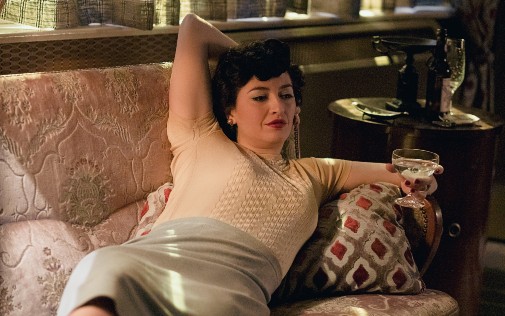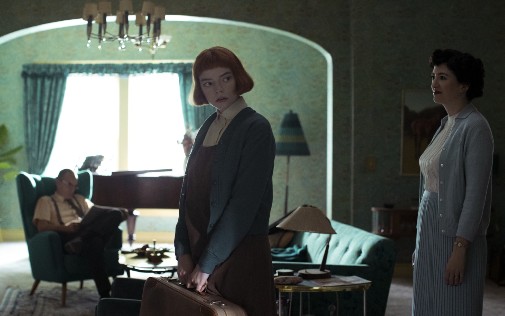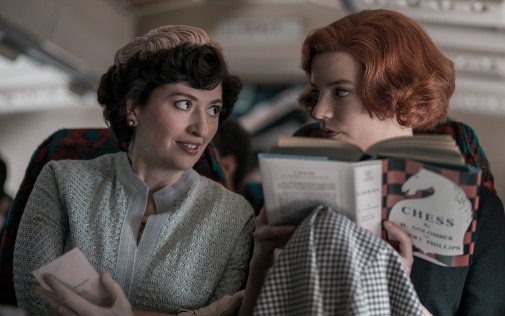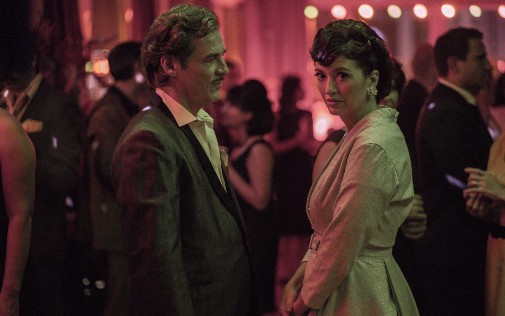
As we all found out this past October Marielle Heller is a woman of many, perchance infinite, talents. Since 2015, Heller has been dazzling cinephiles everywhere with her work as a writer/director. The Diary of a Teenage Girl was one of the best American debuts of the decade. If possible, Can You Ever Forgive Me? and A Beautiful Day in the Neighborhood were even better, analyzing complicated real-life personalities with as much humanistic gentility as razor-sharp precision. All that, and we now know that Heller is also an amazing actress. Returning to her first vocation in splendorous fashion, Marielle Heller delivers the best performance in the popular Netflix awards juggernaut The Queen's Gambit…

I'm not as high as most regarding The Queen's Gambit, but one aspect of the television enterprise did garner my absolute love. I'm referring to the miniseries' supporting cast, who had one hell of a challenge to overcome. By design, Beth Harmon, the protagonist of The Queen's Gambit, must be somewhat of an ungenerous scene partner. Such words aren't a dig at Anya Taylor-Joy, for this is a feature of the narrative, not a bug. The show tells a story of obsession and addiction centering on the orphaned chess prodigy during the 1960s. It makes sense that Beth has trouble connecting and, even with loved ones, there's often an invisible barrier separating the anti-heroine from others. It's an inward-looking characterization, in other words.
This means that every supporting actor, especially those portraying characters close to Beth's heart, must engage in a complex game of ever-shifting paradigms, constantly negotiating between intimacy and distance. Few cast members get more opportunity to explore the possibilities of this acting dynamic than Marielle Heller. She plays Beth's adoptive mother, Alma Wheatley, and from her first scene, we witness a tentative dance between parent and child. Heller vibrates with maternal need tempered, ever so much, by the airless shadows of troubled matrimony. One feels the enthusiasm of the new mother in addition to a soft fearfulness, both because of parental anxieties and the presence of the reluctant father standing nearby.

The early scenes of the new family unit may feel lacking in motion and emotion, if not for the quickness with which the household's most troublesome tensions become evident. Alma's existence is shaped by depression, alcoholism, the broken dreams of a former aspiring pianist, the fluttery stress of an unhappy midcentury housewife. When her husband leaves one day, the floodgates are open, and we get to witness the naked face of dysfunction appear beneath the mask of placid suburbia. The sad truth is that Alma gives up, and Heller plays the transformation with equal parts subtlety and blunt power. Her posture changes, slouches, her kindness loses its edge of manic despair and instead becomes marred by weary exhaustion.
Only parental responsibilities hold her up, and the actress isn't afraid to show her character's ugly side. As we soon understand, the key to Alma and Beth's evolving relationship isn't how it replicates idyllic idealizations of family harmony, quite the contrary. Their closeness emerges as a relationship of peers that can depend on each other. There's a camaraderie to their bond, a growing affection that manifests in a common understanding that neither actresses nor characters ever need to articulate for us to become aware of it thoroughly. In certain regards, it's the sort of gradual character building that is so well suited for TV, where extended durations and episodic structures allow for actors like Heller to suggest the complexities of character through a quiet accumulation of details, nuanced reactions, underplayed joys, and quiet sorrows.
She's funny too. As Alma becomes increasingly aware of the financial gains Beth's chess mastery may bring, Heller allows a glint of mercenary glee to shine from deep within her soulful eyes. She may demonstrate the effect and affect of perpetual overdrinking, but the actress does so with a good amount of rueful humor. It's easy to see why Beth would grow so attached to her adoptive mother. The Queen's Gambit, as a show, becomes increasingly dependent on Heller's Alma to add emotional variation to the first half of its sprawling narrative. During the last trip mother and daughter ever take to a chess competition, Heller is exceptionally fortuitous in her illustration of their bond as well as Alma's need for self-liberation, whether by means of booze or ephemeral romance.

There's no greater compliment I can give to Marielle Heller's work than saying that, after Alma exits the show, her absence is forever felt, aching like a gaping bloody hole in the side of the narrative's body. Her last episode is a thing of beauty, showing the full range of her character's kaleidoscopic interiority, from her amorous disappointment to a tired acceptance of her lot in life, pride for her daughter, and the toxic need for drink. Overall, it's a fantastic feat of acting, all done on the story's periphery and still leaving a lasting impression. While the competition for the Best Supporting Actress in a Miniseries or TV Movie prize is a fierce race this year, I hope there's space for Heller in the final Emmy lineup. Are you also rooting for her?
more on the upcoming Emmys
- COMEDY
- Actress Comedy
- Actor Comedy
- Supporting Actress, Comedy
- Supporting Actor, Comedy
- DRAMA
- Actress Drama
- Actor Drama
- Supporting Actress, Drama
- Supporting Actor, Drama
- MORE...
- Emmy Ballots
- FYC The Handmaid's Tale
- FYC Marielle Heller, Queen's Gambit
- FYC Hannah Waddingham, Ted Lasso
- FYC I May Destroy You
- FYC For All Mankind